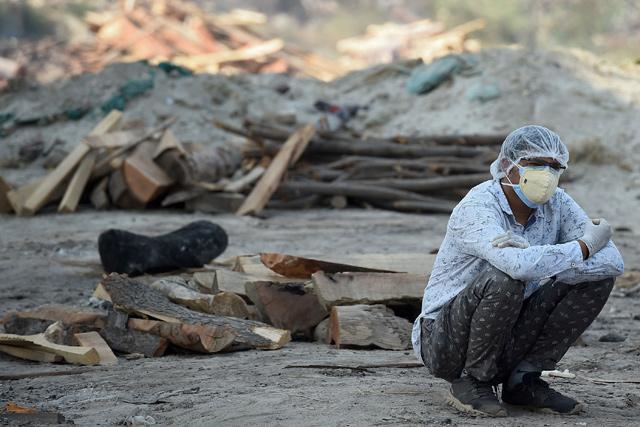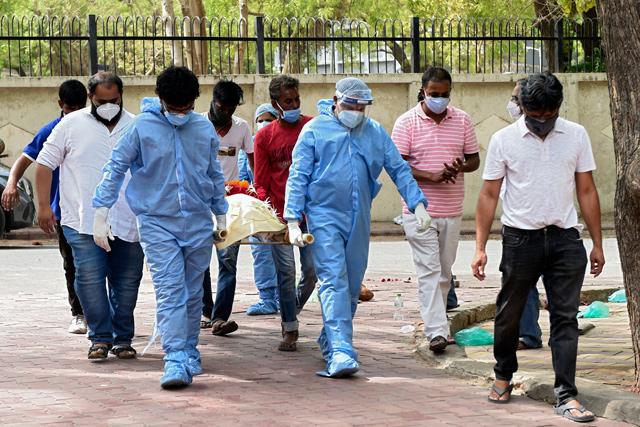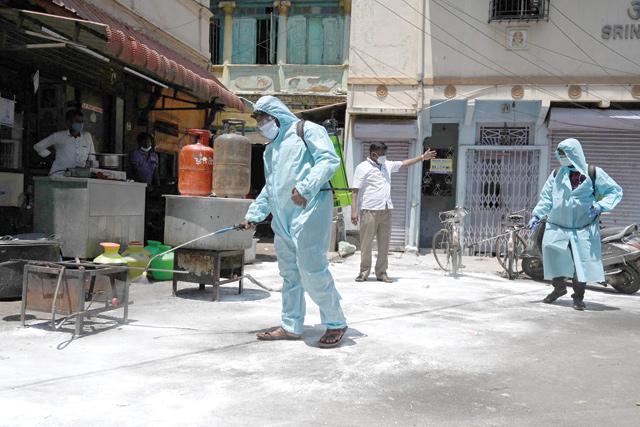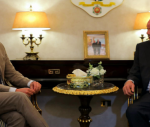You are here
India deaths top 4,000 as Macron urges end to vaccine export limits
By AFP - May 09,2021 - Last updated at May 09,2021

A family member sits near the funeral pyre of his loved one who died due to the COVID-19 coronavirus at a cremation ground in Allahabad on Saturday, as India recorded more than 4,000 coronavirus deaths in a day for the first time (AFP photo)
NEW DELHI — New COVID-19 deaths surged past 4,000 for the first time in India on Saturday in one of the world's worst outbreaks, as EU pressure mounted on Washington to end vaccine export limits and offer a concrete plan to lift patents.
"I call very clearly on the United States to put an end to export bans not only on vaccines but on vaccine ingredients, which prevent production," Macron told reporters at an EU summit in Porto. He was referring to a de facto US ban on the export of vaccine raw materials.
German Chancellor Angela Merkel said the EU had exported much of its own production and the United States should follow suit.
"I do not think that a patent waiver is the solution to make more vaccines available to more people," she said in Berlin.
"Rather, I think that we need the creativity and the power of innovation of companies — and to me, that includes patent protection."
Earlier, Pope Francis had focused on his desire to see patent waivers to "allow universal access to the vaccine."
He called for the temporary suspension of intellectual property rights, condemning the "virus of individualism" that "makes us indifferent to the suffering of others".
The call for waivers has gained momentum after the United States announced surprise support for such a scheme to enable adequate vaccine supplies to fight COVID-19.
In an AFP interview, World Health Organization chief scientist Soumya Swaminathan meanwhile said "early signs were missed [in India] until it reached the point at which it was taking off vertically", meaning "it's multiplying at a rate at which it's very difficult to stop".
As India battles to stem the rising tide, Africa is fretting over a potential knock-on effect regarding vaccine supplies for the continent.
"We are watching in total horror and disbelief what is going on in India and we don't expect that vaccines will be shipped out of India anytime soon," the Director of the Africa Centres for Disease Control and Prevention, Cameroonian virologist Dr John Nkengasong, told an online meetings of African Union health ministers.
An African Vaccine Acquisition Task Team is hoping to acquire vaccines through its programme by the end of July but Nkengasong said he hoped that date could be brought forward.
WHO President Tedros Adhanom Ghebreyesus told the meeting that “what’s happening now in many other parts of the world can happen in our Africa if we let down our guard”, while dubbing the inequitable distribution of vaccines “not just a moral outrage. It’s also economically and epidemiologically self-defeating”.
Earlier Saturday, Madagascar received its first batch of vaccines through the Covax global sharing scheme, one of the last African countries to obtain supplies after months of resistance by President Andry Rajoelina.
EU pushes for exported doses
By Saturday the global pandemic had killed more than 3.2 million people since emerging in China in December 2019, according to a tally from official sources compiled by AFP.
Adding to Macron and Merkel’s appeals, European Council chief Charles Michel said the bloc was “ready to engage” and to discuss a US offer to suspend patent protection on vaccines “as soon as a concrete proposal” emerges.
But Michel, speaking in Porto, added the EU doubted the idea could be a short-term “magic bullet” and encouraged “all the partners to facilitate the export of doses”.
India, which reported more than 400,000 new infections on Saturday — experts fear official data are a gross underestimate — now accounts for nearly half of the world’s new known cases.
Its coronavirus death toll now stands at 238,270,
India’s eastern neighbour Pakistan began a nine-day shutdown on Saturday targeting travel and tourist hot spots, mobilising its military to help enforce the restrictions.
The aim is to stop its outbreak from snowballing during the upcoming Eid celebrations at the end of the Islamic holy month of Ramadan.
Greece tests the water
In Greece, thousands of people hit private beaches, which reopened for the first time this year Saturday.
There were strict spacing requirements in place, regular disinfection of deck chairs and toilets and no music at beach bars.
“We’ve been waiting very long to be able to receive here all the tourists and citizens that want to sunbathe and enjoy the sea,” Andreas Kondylis, mayor of the southern Athens suburb of Alimos told AFP.
The tourism-dependent country hope to launch its summer season next week.
The global arsenal against the coronavirus expanded as the vaccine from China’s Sinopharm became the first fully non-Western shot to get the green light from the World Health Organisation.
The WHO has already given emergency use authorisation to vaccines from Pfizer-BioNTech, Moderna, Johnson & Johnson, and AstraZeneca.
In Japan, concerns remain about the upcoming Tokyo Olympics, with Japan’s vaccination programme moving slowly.
A coronavirus state of emergency in parts of Japan, including Tokyo, was extended Friday.
But International Olympic Committee vice-president John Coates was adamant Saturday that the Games, slated to start on July 23, will go ahead.
Related Articles
NEW DELHI — New COVID-19 deaths surged past 4,000 for the first time in India on Saturday as it struggled with one of the world's worst outb
NEW DELHI — Five of the world's biggest emerging economies on Tuesday called for the development and delivery of COVID-19 vaccines to be spe
GENEVA — The World Trade Organisation(WTO) agreed on Friday to temporarily lift patents on COVID-19 vaccines after two years of bruising neg


















